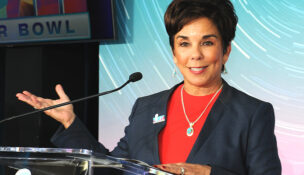McCain can fix down-ballot GOP woes, strategists say
Arizona Capitol Reports Staff//February 22, 2008//[read_meter]
McCain can fix down-ballot GOP woes, strategists say
Arizona Capitol Reports Staff//February 22, 2008//[read_meter]
In spite of a New York Times article published Feb. 21 that suggested he had a questionable relationship with a telecommunications lobbyist, and despite well-documented tiffs with many members of the Republican coalition in his past, top GOP strategists worried about their party’s candidates in House and Senate races this November are thrilled that Arizona Senator John McCain will top ballots across the country.
Because of his long history of bucking his party’s leadership and key elements of the conservative coalition, many believe McCain alone is capable of representing a break from the unpopular Bush Administration. What could have been a decade-long rebuilding process for the Republican Party might even be achieved this year.
Any boost he can lend to down-ballot Republican candidates is much-needed. A new Gallup poll, conducted for USA Today, shows voters preferring a Democratic candidate for Congress by a 55 percent to 41 percent margin over their GOP rivals. That 14-point gap is about the same as it was in late October of 2006, just two weeks before Republicans lost 30 seats in the House and with them, their majority.
With McCain atop the ticket, however, Republicans think they can improve their standing better than any other GOP candidate might have. McCain is viewed as principled and a Washington outsider, despite his years in Congress and his presidential campaign in 2000. He attracts broad support from across the center of the political spectrum.
“John McCain is a national candidate in the truest sense,” said National Republican Congressional Committee spokesman Ken Spain. “He appeals to Republicans, Democrats and independents in all regions of the country, including in battleground states like Pennsylvania, Wisconsin and New Mexico.” Republican incumbents and challengers in those states and others, the NRCC hopes, will look good standing next to McCain.
McCain strategists are aware of their ability to pull their wounded party up in the eyes of voters. On Feb. 20, McCain held a fundraiser for businessman Jim Oberweis, a Republican running to replace former House Speaker Dennis Hastert in northwestern Illinois, pulling in more than $250,000 in one night. Oberweis, who faces a well-funded Democrat and who may soon be the target of national Democratic advertisements, will also stand next to McCain at a media availability, attaching himself at the hip to his party’s standard-bearer.
While his feuds with his own party have been public and problematic, GOP strategists say they won’t be an issue come November. “We did not have a problem in 2006 with the base, and we’re not going to have a problem in 2008 with the base. Where we had a problem was with independent voters,” said Glen Bolger, a pollster whose Virginia-based firm handles dozens of congressional races every year, including the Arizona Republican Party, Rep. Rick Renzi and former Rep. J.D. Hayworth. “What McCain does better than anybody else among Republicans who were running is he gives independents a reason to vote Republican.”
Freed from the rigors of the primary battle, McCain is embarking on a national tour aimed at winning votes in November. His visit to a Ford Motor Company assembly plant in Wayne, Mich., on Feb. 21 was held between two districts where incumbent Republican Reps. Tim Walberg and Joe Knollenberg are being targeted by Democrats.
“Having John McCain at the head of the ticket is, from a purely political angle, a great benefit to GOP House candidates,” said one Republican strategist who is working on House races this year but personally dislikes McCain. “No other Republican reaches independents and Democrats as well, and no other Republican has the credentials to make the Iraq argument as well as he.”
Senate Republicans are hopeful, too, that McCain will aid them in retaining key seats. While the Republican nominee will have a difficult time in states like Minnesota, Oregon, Maine and New Hampshire, the four GOP senators running for re-election in those states will be able to embrace their nominee after they have spent months doing their best to disassociate themselves with the Bush White House. In a statement announcing his endorsement of McCain, National Republican Senatorial Committee Chairman John Ensign, of Nevada, said he “look(s) forward to working with him to elect Republican senators across the country.”
McCain’s ascension comes at an important time for Republicans in his home state, as well. National Republicans are targeting Representatives Harry Mitchell and Gabrielle Giffords, two freshmen Democrats who took Republican seats in 2006, while national Democrats are targeting longtime Republican incumbent John Shadegg, who on Feb. 21 decided to run for reelection. Both parties are also ready to wage war over Renzi’s open 1st District seat.
Two years ago, Democratic Governor Janet Napolitano occupied the top of the ticket. This year, with Republican McCain leading off in voters’ minds, it could draw more GOP voters to the polls. “If you’re in Arizona, you just got the break of a lifetime,” NRCC chairman Tom Cole, a Republican from Oklahoma, said in an interview. GOP chances in all four seats, he thinks, have improved dramatically thanks to McCain.
“Senator McCain at the top of the ticket is the Democrats’ worst nightmare here in Arizona,” added Tony Reinhard, spokesman for the state Republican Party.
National Democrats, though, remain skeptical of McCain’s abilities to help down-ballot races. “John McCain is probably their best candidate in a very weak field,” Democratic strategist Mark Mellman said.
Other Democrats pointed to the fact that McCain scored below 50 percent in a primary in his home state, and that a Rocky Mountain Poll conducted in late July and early August showed Napolitano leading McCain by 11 points in a hypothetical Senate matchup. While the state’s favorite son was on the ballot on Feb. 5, more Democrats cast ballots in the 1st District than Republicans, though Republicans led in statewide turnout.
McCain’s magic, said Democratic Congressional Campaign Committee spokesman Doug Thornell, may be at an end thanks to his problems with members of the Republican base. “While he has a history of appealing to independent voters, independent voters have been turned off by the Republican Party and voting in the Democratic primaries this year,” Thornell said. “I think it’s going to be hard for independent voters to be able to stomach this new John McCain.”
The optimistic views of top Republicans come regardless of the bombshell story, long rumored to be floating around the New York Times newsroom, which implied McCain’s improper relationship and rehashed his involvement in the case of Phoenix businessman Charles Keating in a front-page story Feb. 21. Posted on the Web late Feb. 20, the article quickly drew heavy fire from the McCain campaign, which criticized it as tabloid journalism.
“It is a shame that the New York Times has lowered its standards to engage in a hit and run smear campaign,” McCain communications director Jill Hazelbaker said in a statement. “Americans are sick and tired of this kind of gutter politics.”
Faced with what looked like a damaging article just as McCain turned his attention to a general election matchup with the eventual Democratic nominee, the campaign’s crisis response was nearly flawless. Powerful Washington attorney Bob Bennett, who also represented President Bill Clinton during the Monica Lewinsky impeachment hearings and who was retained by McCain late last year, appeared on “Fox News” within the hour to rebut the charges, while top McCain aides Mark Salter, Steve Schmidt and Charlie Black all offered scathing critiques of the Times’ journalistic discretion.
Q
uestioning the paper’s use of quotes from unnamed former McCain aides, Salter was acerbic. “Are these the standards of The New York Times≠ No. They are the standards of the National Enquirer,” Salter told reporters after the story was posted online.
McCain, at a Feb. 21 morning press conference, flatly denied any inappropriate relationship, personal or professional, with the lobbyist. “I have many friends in Washington who represent various interests,” McCain said. “The question is whether, do they have excessive or unwanted influence. And certainly no one ever has in my conduct in my public life, and conduct of my legislative agenda.”
















